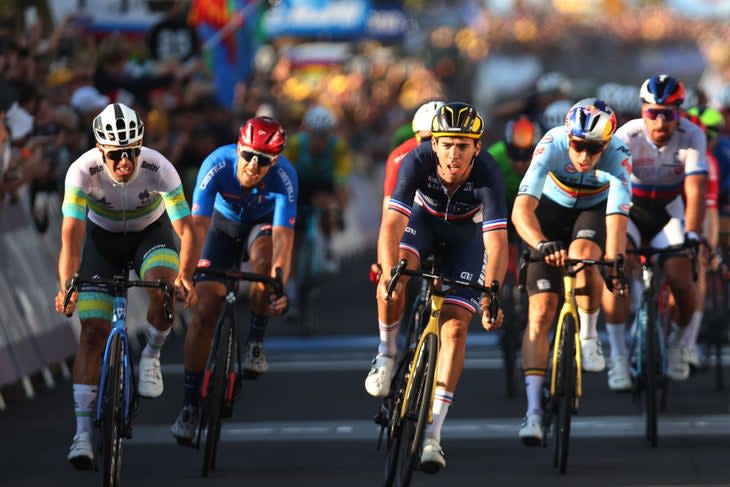UCI sticking firm to no ear-piece rules at worlds, Olympics despite criticism
This article originally appeared on Velo News
The UCI will stick with its policy of racing without race radio on circuit courses at events such as the UCI Road World Championships and the Olympic Games despite a rash of critics in the wake of the Wollongong worlds.
Sunday’s elite men’s road race saw a flood of criticism from riders such as Wout van Aert and Tadej Pogacar, who complained bitterly about the lack of accurate information.
So uncertain was the race situation that on the closing lap that podium finalists, Christophe Laporte and Michael Matthews, both said they did not realize they were sprinting for medals behind emphatic winner Remco Evenepoel.
UCI officials defended its race radio ban in international competitions and told Sporza the policy will stand.
“In the short term, little will change,” Peter van den Abeele, director of sport at the UCI, told Sporza. “The current president, David Lappartient, is also not in favor of turning it back.”
The UCI banned race radio in international competitions nearly 20 years ago in such races as the road worlds and the Olympic Games.
Also read:
Despite providing a safety element, many believed that race radios were sucking the life out of the tactics and spontaneity at such races as the Tour de France, and there was pressure to ban the use of the radio communication.
Under former UCI president Pat McQuaid, the UCI decided that radio communication would be disallowed at international events contested on circuit courses, where dangers of crashes and surprises on the road are largely reduced because teams and riders see the course several times during training and racing.
The race radio ban also blew up in Tokyo, where the elite women were unaware of time splits in the Olympic road race, and Annemiek van Vleuten mistakenly thought she had won.
Van den Abeele: ‘On closed circuits the risks are lower’

Van den Abeele said that policy will remain in place in major international competition despite some heavy criticism in Wollongong.
He defended the argument that the race radio ban injects some surprises into circuit racing.
“If there are no ear pieces, a rider has to rely more on his impulses and is less guided by instructions from the support car,” Van den Abeele told Sporza. “It should make the race more attractive. You create more chaos, in the healthy sense of that word.
“On the other hand, the safety of the rider should not suffer. At the world championships or Olympic Games, where we mainly race on a closed circuit, that safety is easier to check.
“As long as competitions are held on a closed circuit, it is acceptable because the safety risks are lower. On an open circuit it is completely different, there we are in favor of the earphones for safety.”
Riders are still rumbling in the aftermath of Sunday’s race in Wollongong.
Evenepoel was alone off the front to win gold, and no one was going to bring him back.
Riders complained in Wollongong

Yet there was confusion in the closing laps over the time splits to a chase group of several riders. Going into the bell lap, the gap was still hovering around two minutes, and it appeared the medals were gone.
The chase group, however, started to play games in the closing kilometers, and the lead peloton was suddenly breathing down their necks.
It all came together in the final few hundred meters, and the big group was unexpectedly sprinting for the podium.
Riders such as Van Aert, who finished fourth, said the time split information as inaccurate and not consistently displayed to the chasing groups, and criticized that racing without race radio “is from another era.”
"Without radio it's a drama," Van Aert grumbled. "Apparently I crossed the finish line in fourth, but I couldn't tell if I was sprinting for 10th, 15th, or second. It's a pity, because I had the legs to climb onto the podium with Remco."
Pogacar also bemoaned the lack of information, and said it impacted his tactics during the finale, especially when teammate Jan Tratnik attacked late.
"We didn't know which place we were racing for. I thought maybe we were racing for the top-10. We were trying to catch that group with Wout van Aert, but nobody knew we were in the fight for the medals," the Slovenian superstar said.
"We didn't even know where [national teammate] Jan Tratnik was, and all of a sudden we saw him 100 meters before the finish line. In the end, we were left empty-handed."
Adjustments for future editions

Van den Abeele said that the UCI will take lessons out of Wollongong.
There were complaints that the staffers on the motorbikes providing the time splits -- the ardoisiers -- were inexperienced and did not accurately deliver the much-needed information in a timely and efficient manner across the race Sunday.
“What has happened now is also a learning experience for us,” Van den Abeele told Sporza. “You have to make an evaluation after every race and possibly adjust things in the next one.
"The operation of the so-called ardoisier was not good at all in Australia,” he said. “That is why we have already made the decision within the UCI to recruit people with experience for the upcoming world championships.”
Van den Abeele said the UCI will recruit experienced staffers from the Tour, Giro d’Italia, or Tour of Flanders, and no longer outsource it to local organizations or federations.
"We could also increase communication by using electronic boards in the feeding zones, on which the riders can see who is where in the race,” he said. “By the way, that is already done under the finish arc, where the difference between the leader and the riders is shown.”
For exclusive access to all of our fitness, gear, adventure, and travel stories, plus discounts on trips, events, and gear, sign up for Outside+ today.